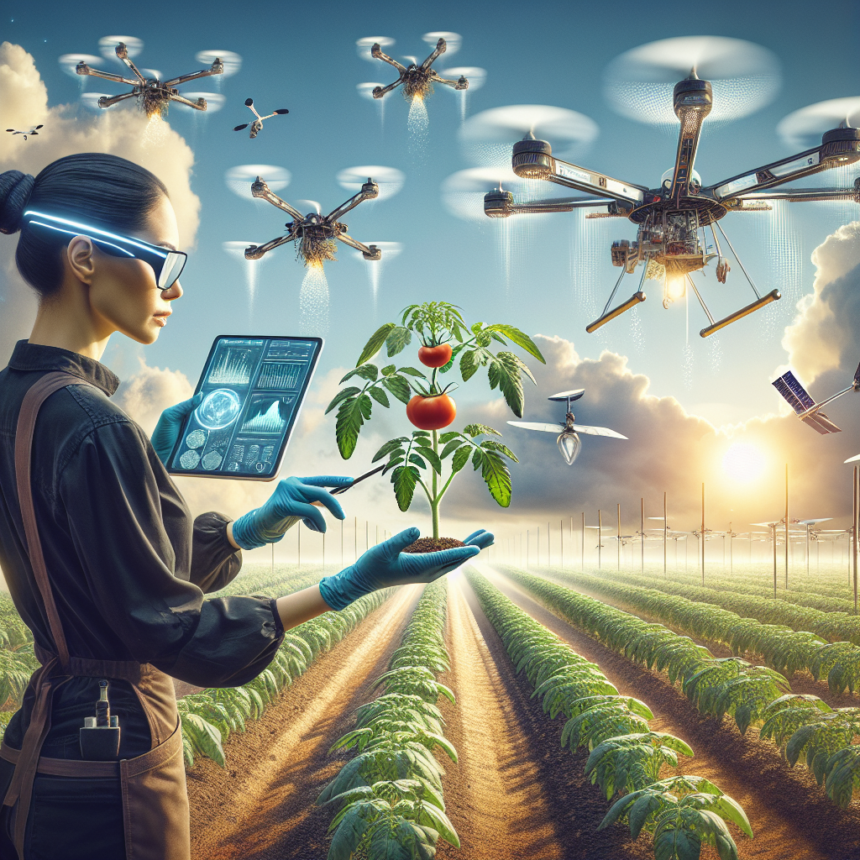Agriculture is undergoing a profound transformation as technologies evolve and the global demand for food increases. Smart farming techniques, powered by the Internet of Things (IoT), artificial intelligence (AI), and innovative data analytics, have emerged as key players in this revolution. These advancements not only optimize the efficiency of food production but also address sustainability challenges that the agricultural sector faces today. This article delves into how smart farming techniques are reshaping the future of food production.
Precision Agriculture
One of the cornerstones of smart farming is precision agriculture. Through the use of sensors, drones, and GPS technology, farmers can monitor their fields in real-time. This technology allows for accurate data collection on soil health, moisture levels, crop health, and environmental conditions. By analyzing this data, farmers can make informed decisions about irrigation, fertilization, and pest management, ultimately leading to increased crop yields and reduced waste.
For instance, drip irrigation systems can be adjusted based on soil moisture readings to optimize water usage, which is essential in regions facing water scarcity. Furthermore, by applying fertilizers only where needed, farmers can reduce costs and minimize soil degradation, which enhances long-term sustainability.
Automation and Robotics
Automation in agriculture has the potential to transform traditional farming practices. The introduction of robotic technologies is changing how tasks are performed, reducing labor costs and human error. Automated tractors, harvesters, and planting drones can work tirelessly, completing tasks more efficiently than ever before.
For example, robotic systems have been developed for tasks like weeding and precision planting. These robots can identify weeds and selectively apply herbicides, minimizing chemical use and promoting ecological balance. Automation ensures that farming can scale with the growing demand while preserving the health of the land.
Data Analytics and AI
The power of big data cannot be underestimated in the realm of agriculture. By harnessing data analytics and AI, farmers can predict market trends, optimize supply chains, and anticipate crop diseases before they become widespread. AI algorithms can analyze historical data to forecast yields, allowing farmers to plan more effectively for future seasons.
Moreover, machine learning techniques can process vast amounts of agricultural data to provide insights into soil health and crop performance, leading to smarter farming decisions. For instance, AI-powered systems can predict weather patterns, enabling farmers to plan their planting and harvesting schedules more effectively.
Sustainable Farming Practices
Sustainability is a central theme in the future of food production. Smart farming techniques contribute to environmentally friendly practices that minimize the carbon footprint of agriculture. Technologies such as vertical farming and hydroponics utilize space more efficiently, allowing for food production with reduced land use.
Additionally, regenerative agriculture practices, supported by smart farming techniques, promote soil health and biodiversity. These methods, which may incorporate cover cropping, crop rotation, and controlled grazing, enhance the resilience of food systems against climate change.
Blockchain for Transparency
Blockchain technology has emerged as a powerful tool for ensuring transparency in the food supply chain. By tracing each step from farm to table, producers can assure consumers of the origins of their food, promoting trust and safety. Smart contracts, enabled by blockchain, can facilitate transactions directly between farmers and consumers, cutting out middlemen and ensuring fair compensation for agricultural products.
FAQs
What is smart farming?
Smart farming refers to the integration of advanced technologies, such as IoT devices, data analytics, automation, and AI, in agricultural practices to enhance efficiency, increase productivity, and promote sustainability.
How does precision agriculture benefit farmers?
Precision agriculture benefits farmers by providing real-time data on field conditions, allowing them to make informed decisions about irrigation, fertilization, and pest management, ultimately leading to increased yields and reduced waste.
Are there any disadvantages to smart farming techniques?
While smart farming technologies offer numerous advantages, challenges such as high initial costs, the need for technical knowledge, and potential data privacy concerns might deter some farmers from adopting these methods.
How does automation affect labor in agriculture?
Automation can lead to reduced labor costs and increased efficiency; however, it may also displace traditional farming jobs. It’s crucial for the agricultural sector to balance technological advancements with the need for skilled labor.
What role does data analytics play in modern farming?
Data analytics helps farmers make data-driven decisions regarding crop management, resource allocation, and forecasting market trends, ultimately improving productivity and sustainability in agriculture.
As the world continues to evolve, the agricultural sector must adapt to meet the challenges ahead. Smart farming techniques stand at the forefront of this transformation, offering viable solutions that promise a more sustainable and efficient future for food production. By embracing these advancements, farmers can not only boost their productivity but also contribute to a more resilient food system for generations to come.











